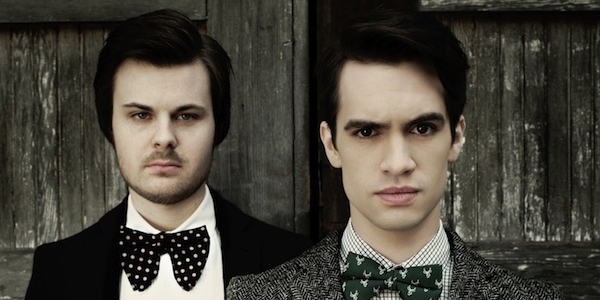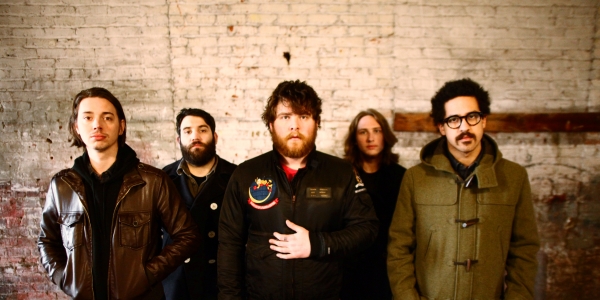It transpires during our conversation that there’s a logical reason for the similarities between the first and most recent albums. When I ask Smith about the time where the future of PATD was uncertain, his voice takes on a philosophical edge. “Initially in the beginning, what we wanted to do was a bit in question,” he readily admits. “For me and Brendon, we knew we wanted to work on music together, but we didn’t know if it was going to be Panic, or something different. But it seemed like the right decision to continue on with the band.
“What we wanted to do was more in line with what we had done previously, so when it came to the actual songwriting – although we had been part of the process for the previous two records – there were certain aspects of it that inevitably were going to change. There were certain responsibilities we had to take on. Even though it’s all under the same name, it’s still looked at as a chance to have a fresh start and a new opportunity to put out a record that was representative of what we really wanted to do. It’s taken a little while for us to figure out what that was. And now that we’ve gotten over that hump, I feel like now we’re in a position where we feel confident as a band.”
Returning to the studio a year and a half ago to begin recording Vice & Virtues, they went ballistic and wrote a prodigious amount of songs; more than could possibly fit on their newest venture. What was the inspiration that had stuck them so completely? “We were wanting to make sure the record was as good as we wanted it to be, and as good as we knew it had to be – and at a certain point we got this comfortableness working together, and that’s where it got to a point where we were less critical of what we were doing and just trying to get out whatever it was we wanted to talk about. And I think lyrically we knew that it would be a little bit weird if we didn’t address some of the things that had happened in the last couple of years with the band.
“There was obviously other personal experiences and looking forward to the future, so I think we really felt excited about getting back to the mentality that we had on [A Fever You Can’t Sweat Out], where we were just like, ‘You know what, we don’t expect anybody to really care about this, so let’s just write something that we feel is new and different and that we haven’t heard;’ and that’s not how we felt when we were doing our second album, Pretty. Odd. So that was the exciting thing that pushed us and gave us the motivation to get through – and now that we’ve gotten past that, it’s just been all positives.”
All positives, indeed. Vices & Virtues was released earlier this year to critical acclaim, and has been selling like hotcakes. PATD has been touring like crazy for the last seven months, wowing audiences worldwide with their frenetic and quite theatrical performances chockfull of wild costumes, over-the-top special effects and a distinctive gothic steam-punk mentality. I ask Smith about their flair for theatrics, and where it might have come from.
“Yeah, I’m kind of curious about that myself!” he chuckles. “For whatever reason we naturally wanted to take the show a bit further than just a rock concert and into something more theatrical. We’ve had that [theatricality] since we started doing larger shows. A lot of people ask if it’s because we grew up in Las Vegas, where there are a lot of huge production shows. But we got signed when I was 18, and nobody who lives in Vegas really spends much time down in the touristy areas.
“Maybe it was just growing up in the environment and it seems more natural to us. I think it comes from going to shows as a teenager and just seeing the same thing over and over – bands just putting up as many lights on the stage as they can, and just trying to figure out ways to make their shows something different. A lot of times, you go to the same venue, and see bands over and over again, and it’s great – if it’s a good venue. But we do as much as we can to change the look of the venue so hopefully it feels a bit different then when you were there a couple of weeks ago!”
Since 2004, when the young band first sent a three-track demo tape to Fall Out Boy’s Pete Wentz and ended up getting signed to his label Decaydance, PATD’s emotional growth as a cohesive musical act has been noticeable. What’s interesting about the music on their three LPs is that it’s nearly impossible to pigeon-hole their work.
I mention this to Smith, and enquire if perhaps it’s helped them attain more freedom to record whatever they want, and not be beholden to any particular sound or genre. “Well, [back then] we were very much a prisoner of the moment of being 17 and 18 [years old], and I don’t know many people who would love to have what they were fascinated with musically at that age broadcast to as many people as on our first album. But at the same time I’m not gonna complain about it, because it’s allowed us to be able to do what we do now. So it is what it is, and when we were on the second record, it was a pretty drastic change musically.
“And again, that was going from being 18-19 years of age to being 21 – you go through a lot of changes at that time, and I think we kind of became fascinated with all this music we were hearing from our parents when we were younger, like late ‘60s and ‘70s music. When you’re 15, you don’t want to like what your parents like, ‘cause that’s not cool, you know? Then you realise when you’re older that ‘fuck, that’s some good shit,’” he says, a knowing grin clearly audible over the phone.
“[Vices & Virtues] was two months of our lives and our being fascinated with [‘60s and ‘70s bands and productions]. We still love those bands, but I feel like this most recent record is us realising that we don’t want to get stuck in this trap of ‘Well, everything has to fit within this confined area of music that happened within this ten years from 1965 to 1975’ – let’s try to create something that’s influenced by everything … every band we’ve liked over the last 40-50 years, and create something new that we haven’t heard.
“The bands we love, like The Beatles, The Beach Boys, or The Who – that’s what they were trying to do; as much as they were trying to emulate stuff that they loved and they were still trying to create something new, so I feel that’s kind of where we are now, and still not satisfied with what we’ve done, but it’s sort of the beginning of that kind of thing, you know.”
As the interview approaches its end, I state that I’m happy for them that they are able to come to Australia after all. As one of the acts slated for the shelved Soundwave Revolution, it was beginning to look as if a trip Down Under just wasn’t in PATD’s cards. “Yeah,” Smith admits, “for a minute there I didn’t think we were gonna be able to go when the whole fucking thing got cancelled. Luckily, they were able to figure it out!”
Just as their Aussie fans must be breathing a bit easier, so to can Smith and Urie, now that they’ll be able to bring their madcap musical stylings to Australia, an outing Smith finds most appealing. “Australia has always been one of the places we felt most comfortable going to,” he adamantly states. “Besides the shows, and the crowds being very enthusiastic, Australia’s the sort of place where we don’t feel out of place. Sometimes [with traveling overseas] there’s a language barrier, or there’s a real culture shock; we don’t really feel at ease. But once in Australia, we really feel comfortable. So hopefully we get a few days and will be able to just meander about and do our own thing, cause if we get to do that, then it makes the show the next day that much more exciting! I love playing shows in Australia, but I still love the country and the continent itself, and I’d love to see as much of it as I possibly can.”
BY THOMAS BAILEY







